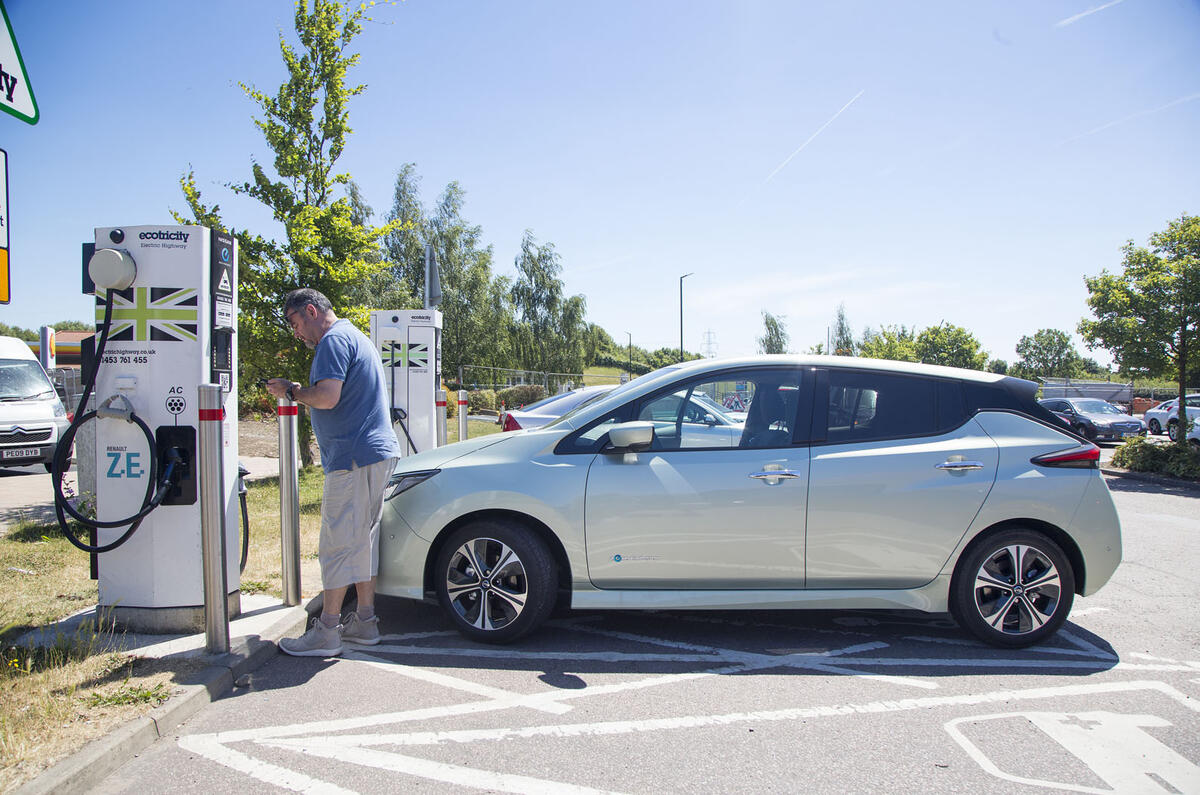There are now more electric vehicle (EV) charging stations in the UK than conventional fuel stations, according to data published by Nissan.
The Japanese car maker has revealed that as of August, there are 9199 EV charging stations across the country, compared with 8396 fuel stations.
The UK’s first fuel station was opened exactly 100 years ago at Aldermaston in Berkshire. The number of fuel stations peaked at 37,539 in 1970 but has been in steady decline since, with more than 3000 sites closing between 2000 and 2005.
EV charging sites, by contrast, are increasing in number rapidly. There were 913 in 2012 but 6699 by 2018, and more than 2000 have been installed so far this year. The current figure of 9199 includes more than 1600 rapid-charging points.
Nissan’s data, based on information from the Energy Institute and Zap Map, shows a notable change in London: while there are now only four fuel stations within the Congestion Charge zone, Transport for London has activated more than 1000 EV charging points in the past year.
The comparison isn't a direct representation of how many vehicles can be filled or charged at any one time, however, because while most fuel stations house at least four pumps, many of the EV charging sites contain only a single charger.
Nissan GB's managing director, Kalyana Sivagnanam, said: “We’ve moved beyond the early concerns of range anxiety, with EVs now exceeding the vast majority of customer’s daily driving needs. The next challenge is for charging infrastructure to keep pace with the number of EVs on the road, and that the experience of recharging is as enjoyable and effortless as that of all-electric driving.”
The British government recently pledged £2.5 million to provide more charging facilities in residential areas as part of its plan to bring the country's CO2 emissions down to almost zero by 2050.
Latest industry figures show that demand for EVs increased by 158% in July over the same month in 2018.
Read more
UK government doubles investment in residential charging point scheme
Battery EV sales hit new peak in July; PHEV struggle continues
BP Chargemaster activates first 150kW ultra-fast EV chargers









Join the debate
Add your comment
Meaningless figures
There may be more charging sites than fuel sites, but how many charging points are at these site, compared to how many fuel pumps there are.
I have never had to open an app or figure out which point I can use, and if it will accept my payment method when I have had to refuel with fossil fuel, choose either diesel or petrol and crack on, the media and forums are full of stories about the trouble people have to go to to recharge, and if the vehicle actually charges as it should..
Standard Charging Points
....but how many work?
And how many are alway hogged by other drivers?
There needs to be many many more ev stations that’s petrol stations if ev’s are ever going to work.
My brief trial hiring ev’s to see how practical they were proved beyond doubt that here in Dorset at least they were hopeless without a home charger.
Thekrankis even beyond just
Thekrankis even beyond just having a home charger. That’s why we now have a PHEV now rather than a BEV. We have a home charger & used to have a Zoe. Absolutely fantastic within 40 miles of home or on a long journey with guaranteed destination charging. However we have a holiday property in Christchurch with no destination charging & even with the charger in Christchurch town centre I would have to spend close on an hour most days in the ground floor of a multi story car park. Not how I want to spend a holiday. So NIro PHEV currently suits our use. 25 miles commute pure electric yet 50+ mpg when driven briskly & top up where available on holiday.
Yer what?
A meaningless comparison if ever there was. I for one don’t have a petrol station at home, but I can charge my car, though only 10amps at the moment. Still, stick all the accessible 13amp sockets into the sum and you have another meaningless comparison. I guess all Mr Nissan is trying to say is that there has been an increase in chargers - huzzahs! What he hasn’t said is about having to sign up for each species. Stupid, you only need a credit card to by petrol, legislate to make it the same for charging.